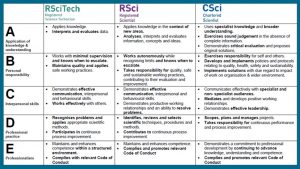It has been recognised for some time that the technical workforce makes a vital contribution to, not only the HE environment, but to UK PLC generally. The expansion of the already well-respected Professional registers (eg. Chartered Scientist – CSci, Chartered Engineer – CEng) to include new registers for the technical workforce is largely in recognition of the increasing importance and contribution of technical community, and the imperative to ensure that technical staff are provided with suitable development opportunities going forward.
The Chartered registers cover a broad range of disciplines and sectors, with discipline specific Chartership’s being available (eg. CBiol, CChem) as well as sector specific options like CSci and CEng. Whilst Charterships have been available for many years, it is only in more recent years that members of the technical workforce have been actively encouraged to apply for these awards. The relatively recent introduction of specific technical registers has now provided a more extensive framework via which technical staff can develop their careers. The Science Council introduced additional registers for technical staff ie. Registered Scientist (RSci) and Registered Science Technician (RSciTech) some years ago, as did the Engineering Council with their EngTech and the ICTTech registers. The addition of these registers provides a progression route through to Chartership for technical staff if their underpinning knowledge, expertise and role responsibilities justify such recognition.
Professional Registration is a voluntary means of demonstrating that individuals have reached an internationally recognised standard of competence and acknowledges that an individual’s commitment to maintaining and/or enhancing that level of competence in the future. Professional registration is achieved through peer recognition of competence, adherence to ethical standards and commitment to society, the profession and the environment.
Professional Registration Framework
Using the Science Council as an example of the way in which technical staff can gain recognition and increase visibility, the following guidelines will indicate how their framework and registration levels are structured.
The different registration levels are aimed at staff with the following profiles:
Academic requirements
- RSciTech applicants must have a level 3 qualification or equivalent learning and achievement
- RSci applicants must have a level 5 qualification or equivalent learning and achievement
- CSci applicants must have a level 7 qualification or equivalent learning and achievement
Qualifications need to be in a science discipline or relevant practice. In the case where a relevant qualification is not held by the applicant, an equivalent programme of study may be approved, where an equivalent level of science knowledge and practice can be clearly demonstrated.
International qualifications will need to be recognised by UK-NARIC/ECCTIS – The National Recognition Information Centre.
Work Experience requirements
Applicants needs to be able to demonstrate a level of competence aligned to the registration grade for which they are applying.
- RSciTech would normally be expected to have at least of 1 year’s post-qualification experience
- RSci would normally be expected to have at least of 2 years post-qualification experience
- CSci would normally be expected to have at least of 5 years post-qualification experience
As can be seen from the above entry at the RSciTech level should be possible for most technical staff once they have been in post for at least a year and that their job role allows them to demonstrate the acquisition of the appropriate level of competence within that year.
It is worth noting that more recently considerable work has been done to align the registration level with Apprenticeships and T-Levels, and suitable career pathways progression is being mapped out in these areas.
Comparison of the Registration Levels
We can see from the comparison matrix below how registration can be secured at different points in a technical career, and how progression through the levels can be achieved.

What are the benefits of Professional Registration?
The benefits of Professional Registration at individual technician/technical specialist level are many and varied, just some of them being listed below:
- Be publicly recognised and certified for their professional excellence, competence and knowledge.
- Greater status, influence and self-esteem.
- Clear evidence of skills/expertise at a recognised standard
- Demonstrates ethical credentials.
- Can improve chances of potential career prospects and employability.
- Greater influence within their organisation and industry.
- Higher earning potential.
- Access life-long learning resources and confirm your commitment to CPD.
- Become a leader within the field.
- Being part of a national community of cross-disciplinary technical personnel
The benefits of Professional Registration at organisational and employer level are also diverse and numerous, a few of these are listed below:
- Demonstrates investment in staff, which can aid recruitment and retention of key staff
- Motivated and committed staff who feel valued and supported
- Assurance of quality of service/support provision
- Continuous improvement of the workforce and their service/support provision
- Maintain repository of skills and experience and save time/costs on retraining
- Ethical standards are maintained
- Gain competitive advantage, particularly where quality if key
- Benefit from informed, expert input in decision making processes
Summary
Professional registration provides a benchmark through which the public, employers and their customers/clients can have confidence and trust that registrants have met internationally recognised professional standards.
Much has changed in recent years in the HE sector and beyond and for technical staff professional registration represents a major step forward in their career development options. The important drivers for this development coming from a variety of organisations and initiatives:
- The Science Council and Engineering Council
- The Gatsby Foundation
- The Technician Commitment Initiative
- Technicians Make it Happen
- Professional Bodies Licenced to award to the Registers
- National Technician Development Centre
- …..to name just a few
In addition to ongoing projects to support and enhance technical development by external organisations, the increasing recognition of the importance of the technical workforce within their own organisations and the wider community is feeding the drive to continue this development.
The Government has ambitions to become a science superpower. To achieve this, it has committed to increase public funding for R&D to £22 billion per year by 2024-25 as part of its longer-term goal to increase UK investment in R&D to 2.4% of GDP by 2027 [1,2}. If the UK is to become a science superpower, it will need appropriately skilled research and technical workforce in place, to effectively deliver the uplift. The drive to promote and increase professional registration amongst the technical workforce is key to this, and HEI’s will need to be able to progress such development if they are to get the best out of their technical staff, ensure sustainability of their workforce and deliver on their (and Government’s) future targets.
References:
[1] https://assets.publishing.service.gov.uk/government/uploads/system/uploads/attachment_data/file/1004685/r_d-people-culture-strategy.pdf
[2] https://assets.publishing.service.gov.uk/government/uploads/system/uploads/attachment_data/file/1009577/uk-innovation-strategy.pdf
About the author: Joan Ward started her career as a trainee technician at the University of Manchester, with minimal science qualifications. She worked in a number of roles in their bioscience labs whilst gaining additional qualifications in science subjects up to degree level (Open University). Following on from her basic grounding in teaching/research she then spent 10 years as a Lab Superintendent/Manager, during which time she secured approaching £1m in grant income (over several years) to support the development of trainee technician programmes (in collaboration with a local FE College). In addition she also helped develop and roll-out a bespoke software package designed to handle HE departmental/faculty accounts and research grants – the software ultimately becoming adopted by over 400 departments across the country/HE sector. After some departmental/faculty restructuring she then moved into a Finance/Admin role where she set up a new Faculty finance, purchasing and research administration unit – also completing an MBA (Open University) during this time.
After spending several years consolidating the new integrated Faculty finance/research grants unit, and helping to roll-out the model to other faculties, she decided to take advantage of a University early retirement scheme and ‘jumped ship’ to set up her own consultancy company, which she continues to run today. Her company provides consultancy support for admin systems development and website design/development. Having joined the Institute of Science & Technology (IST) during her time as Lab Manager she continues to support the work of the Institute as Finance Officer and Deputy Chair.
Within her roles in the IST Joan was part of the team that obtained funding for and facilitated the establishment of HEaTED. She was also heavily involved in the IST team that gained a Science Council Licence for the award of CSci, RSci and RSciTech professional registration. She currently sits on the Board of Trustees and the Registration Authority Committee of the Science Council and is also a member of the Board of Trustees of the National Technician’s Development Centre. Joan has a strong commitment to the development of career opportunities for the technical workforce and the enhancement of professionalisation of technicians, and this is exemplified in her support for a variety of initiatives that work towards those aims.
